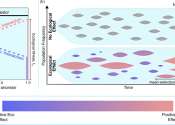Mathematical model aims to curb teen drunken driving fatalities
Drunken driving claims 37 lives daily in the U.S. with teen and young adult drivers disproportionately involved. Niyousha Hosseinichimeh in the College of Engineering has partnered with researchers across the U.S. to create ...
Jul 22, 2024
0
0









